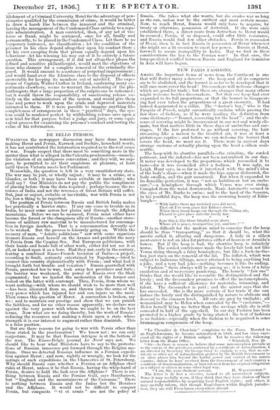DE BELLO PERSICO.
-WHATEVER the newspaper discussion may have done towards making Herat and Persia, Barrack and Bushire, household words, it has not contributed the information required as to the real cause of war. People suspect that there must be something more in the matter than what is alleged in the Calcutta proclamation—namely, the violation of an ambiguous convention ; and they will, we sup- pose, be permitted to air their suspicions at pleasure, at least until Queen Victoria meets her Parliament.
Meanwhile, the question is left in a very unsatisfactory state. The war may be just, or wholly unjust ; it may be a crime, or a blunder, or both; it may have been evitable or inevitable ; who shall say ? Our Ministers do not pay the public the compliment of placing before them the data required ; perhaps because the re- venues of India and not the revenues of Great Britain will suffer. But just or unjust, evitable or inevitable, war with Persia is not the less a thing to be regretted. The position of Persia between Russia and British India makes her practically a barrier state. If any one come to trouble us in India, he must come across her plains and through the Affghan mountains. Before we can be menaced, Persia must either have become the forced or the obsequious ally of Russia—another store- house of military raw material to be manufactured for consump- tion in foreign markets. That is a consummation devoutly not to be wished. But the process is leisurely going on. Within the memory of man, " Asiatic politicians " saw with some sagacious tremors Russia seat herself on the Araxes and prohibit the navy of Persia from the Caspian Sea. But European politicians, with their hands and heads full of other work, either did not see it at all, or looked upon it as a bore. Had they not, early in the century, fearing a combined Russo-French invasion of India--a project, according to Soult, seriously entertained by Napoleon,—tried to connect this country diplomatically with Persia; and what had it brought forth but trouble and vexation ? Russia ,quarrelled with Persia, provoked her to war, took away her provinces and forts ; the barrier was weakened, the power of Russia over the Shah augmented ; but we lauded the moderation of the former and looked on the latter with contempt. Thus, Persia, from whom we want nothing—with whom we should wish to be more than well —has been alienated from us, and thrown into the arms of the very power which has injured her and can injure us the most. Then comes this question of Herat. A convention is broken, say we ; and to maintain our prestige and show that we can punish the faithless, and for no other reason apparently, we declare war against the very power with whom we ought to be on the best terms. Now what are we doing thereby, but the work of Russia ? reducing the resources and making a drain upon a state whose strength it is our interest to augment rather than diminish. This is a false position.
But are there reasons for going to war with Persia other than those stated in the proclamation ? We know not ; we can only conjecture. It may be that Russian intrigue is at the bottom of the war. The Russo-Belgic journal Le Nord says not. We should like to hear what Ministers have to say to the protesta- tions of Russian innocence put forward through the Belgian me- dium. Once we detected Russian influence in a Persian expedi- tion against Herat ; and now, rightly or wrongly, we look for the springs of such expeditions in the Chanceries of St. Petersburg. Why should Russia care whether a Persian or an Affghan chief rules at Herat, unless it be that Russia, having the whip-hand of Persia, desires to hold the lash over the Afghans ? There is no- thing between Russia and the Persian Gulf, says Haxthauscn, but " England and the mountaineers of the Caucasus." There is nothing between Russia and the Indus but the Heratees and the Affghans. It would not be difficult to conquer Persia, but conquests " vi et armis " are not the policy of Russia. She takes what she wants, but she evades war as long as she can, unless war be the swiftest and most certain means. Now, to reach Herat, Russia would only have to acquire, by treaty or otherwise, possession of Astrabad. if she were once established there, a direct route from Astrachan to Herat would be secured ; Persia, if so disposed, could oiler little resistance, and Russia would find few other obstacles. Persia in possession of Herat, then is in fact Russia in possession of Herat whenever she might see a fit occasion to exert her power. Russia at Herat, farewell to secure tranquillity in India. May we find in these considerations the key to the Persian war ? In that case, the long-predicted conflict between Russia and England for dominion in Asia will have begun.


























 Previous page
Previous page